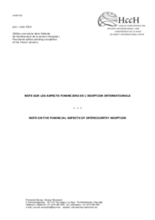The involvement of professionals in intercountry adoption processes ensures that the standards and guarantees set out by the Hague Convention on the Protection of Children and Cooperation in Respect of Intercountry Adoption are met. Involving said professionals, and compensating them for their work, necessitates a certain amount of reasonable and lawful fees for adoption services provided. However, a lack of clarity around what is “reasonable” can lead to the misuse of funds, excessive fees for adoptive parents, and improper financial gains for certain actors (sometimes involving child abduction, trafficking, or sale of children).
To address this issue, the Hague Convention initiated an Experts’ Group, which met in October 2012 and produced nine Conclusions and Recommendations, which they brought to the Permanent Bureau to publish as a “Note”. This Note includes definitions of the terminology on the financial aspects of intercountry adoption as well as chapters on: the existing international legal framework and standards, the main victims of financial abuses, the main perpetrators of financial abuses, the challenges in the global context, the problems and good practices relating to costs and donations, the specific problems and possible good practices relating to contributions and donations, the problems related to improper financial or other gain and some of the good practices to address them, and the practical tools recommended by the Experts’ Group. The note ends with a section on the longer-term future of the Experts’ Group.
Some of the challenges concerning the financial aspects of intercountry adoption include: a general imbalance of wealth between States, pressure and competition to find children, lack of political will and governmental impediments to the elimination of profiteering, dependency on the funds linked to intercountry adoption, the market around adoption, as well as the risks associated with private, independent and non–Convention adoptions. There is also often a lack of transparency in international adoption processes, a wide variation in (or lack of) fee limits, unregulated donations, and lack of adequate legislation on this issue.
The Note offers solutions to these problems, including effective sanctions, proper supervision and monitoring, regulating donations, limiting the amounts of adoption fees and what services are chargeable, and enhancing transparency. It also includes recommendations for the development of particular practice tools such as a questionnaire on the financial aspects of intercountry adoption for contracting States. The Note concludes by looking to the future and offering recommendations on the development of tools to provide further clarity to the issue, ensuring action by all States, bringing about changes at the State-level, and the improvement of adoption practices of accredited bodies in relation to financial issues.

